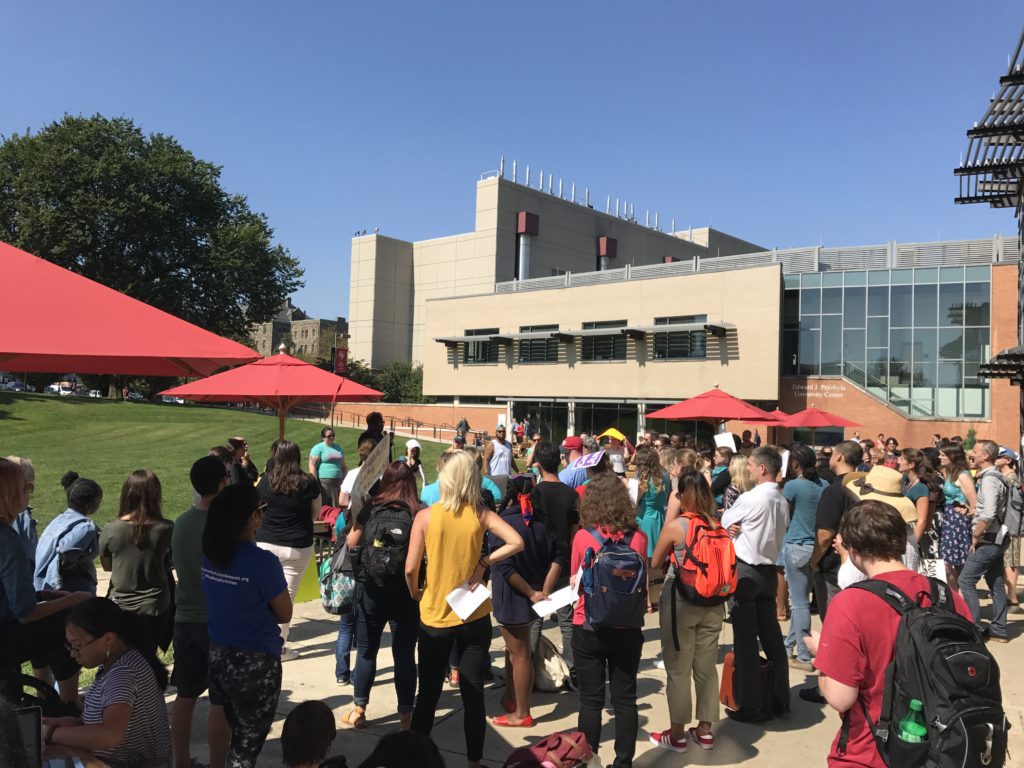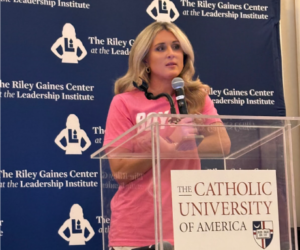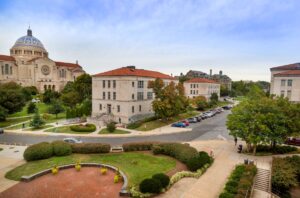Social Work Protesters Focus on Survivors After Dean’s Tweet
Protesters held a demonstration on Monday, which started outside the Pryzbyla Center and moved around campus, in opposition to a tweet posted by Will Rainford, the dean of the National Catholic School of Social Service (NCSSS).
Rainford used his @NCSSSDean Twitter handle to criticize recent Brett Kavanaugh accuser Julie Swetnick.
The protest was organized by NCSSS graduate students, and was the second demonstration in the past few days after over 40 social work graduate students walked out of field seminars last Thursday.
During the walk out, the graduate students created a list of five demands, which called for the resignation of Rainford, the appointment of a woman to replace him as dean, a public apology from President John Garvey, an affirmative statement from the university on protocol of sexual assault and harassment, and a donation from the university to the Rape, Abuse & Incest National Network.
Father Jude DeAngelo started the gathering with a prayer. Several speakers associated with the school, most of them survivors of sexual assault themselves, spoke afterwards about the change needed in the school.
Indira Henard, who received her Master’s in Social Work in 2016, is the executive director of the DC Rape Crisis Center and on the adjunct faculty staff for NCSSS.
“This is a watershed moment for sexual violence,” Henard said during her speech at the protest. “There is not a walk of life that sexual violence does not impact, and NCSSS is no exception to that.”
Garvey responded to the outrage caused by the tweet just two days after it was posted in an email sent to all undergrads on Friday, September 28.
“Rainford has led the National Catholic Social of Social Service since 2013. It is my desire that he continue to lead the school. But in light of these recent actions I have suspended him as dean for the remainder of this semester,” the email read. Associate Dean Marie Raber will serve as acting dean during Rainford’s suspension.
For many students gathered to protest, this temporary suspension was not enough.
“We do not feel this satisfies the demand,” said Kate Myers, a graduate student who helped organize Monday’s protest. “It seems like a hollow attempt to mollify the community.” The student organizers called for “real accountability, not performative accountability.”
After listening to speakers for an hour, about 90 protesters started the march around campus, beginning with the Basilica of the National Shrine. The group then walked between Shahan and McGivney Halls, where social work students have most of their classes, and ended at Provost Andrew Abela’s office in McMahon Hall.
Sheina Godovich, a doctoral student in clinical psychology, valued the “emphasis on the experience of survivors”.
“Focusing on the experience of survivors matches with the message of healing as opposed to anger,” Godovich said.
Randy Leahy, an alum of the engineering school, disagreed with the purpose of the protest. He brought a sign that said “If you believe Swetnick, don’t go into social work”.
Leahy believed that Rainford was courageous for calling out Swetnick.
“I think [the protest] was really unfair to Dean Rainford in that it assumed the veracity of Swetnick’s claim,” he said. “I disagree with the decision [of Rainford’s temporary suspension]. I’ll be very even more unhappy if he’s eventually fired; I don’t think I’ll give the university another penny.”
The National Center on Sexual Exploitation planned to host a “Child-on-Child Harmful Sexual Behavior” symposium at Catholic October 9-10, but emailed registrants on Tuesday, the day after the protest, to inform them that “in light of insensitive and inappropriate tweets made by the Dean of the School of Social Service, we find it necessary to suspend this event as the School handles these matters”.
Henard thought the protest went well due to the organization and clarity of students and alumni, but emphasized the need for a plan for healing and change in the school going forward.
“You can remove the person that is causing harm, but you still have to come together to close the wound and heal,” Henard said.
Contributions by Katie Hodgdon








